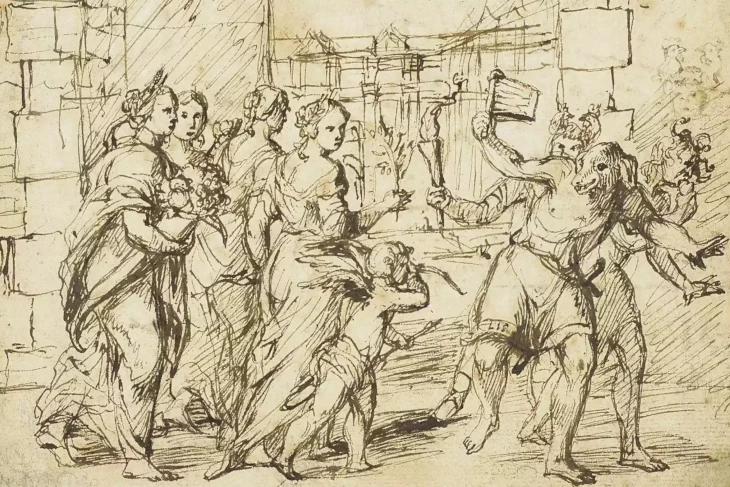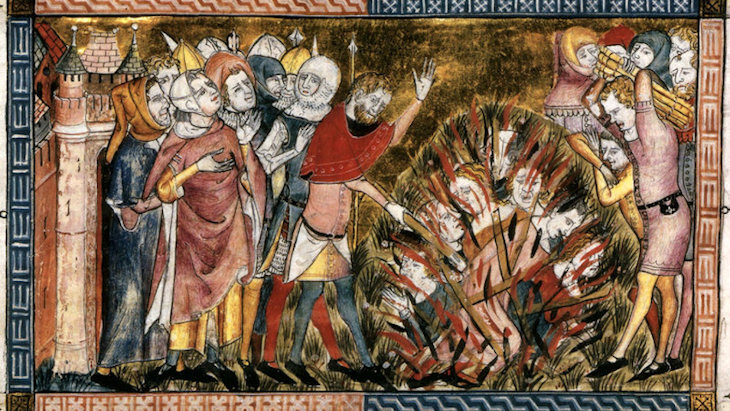 Iran’s Attack on Israel
Iran’s Attack on Israel


8 min read
The history of Valentine’s Day shows there’s more to the day than greetings cards, flowers and chocolate – and some good reasons why it’s been avoided by many Jews.
In ancient Rome, February 13-15 used to be Lupercalia, a festival of fertility that saw three days of carousel, license, and mayhem. Cambridge University professor Mary Beard describes the holiday’s bizarre rites: “at the festival of Lupercalia…naked young men ran round the city whipping any women they met.” Lupercalia also involved some pretty bloody sacrificing of dogs to the god Lupercalia (the Roman name for the Greek god, known for his impishness and nasty sense of humor, Pan).
Lupercalia was popular for over a thousand years, from the very founding of Rome in the 8th century BCE, to the 5th century CE. (It was one of few Roman pagan holidays routinely celebrated by Christians even after Christianity became the official religion of the Roman Empire in 380 CE.) Thousands of Jews lived in Rome during the many centuries when Lupercalia was celebrated. (The Emperor Titus deported an estimated 50,000 Jews from Judea to the city of Rome in the year 70 CE alone.) How did they view this annual libertine festival?

Prof. Beard notes that “ancient Roman religion (was not) particularly concerned with personal salvation or morality. Instead it mainly focused on the performance of rituals that were intended to keep the relationship between Rome and the gods in good order....” (quoted in SPQR: A History of Ancient Rome by Mary Beard: 2015). It’s a view that’s opposed to contemporaneous Jewish writings. Take the example of Hillel, the 1st Century CE Jewish sage who lived at a time when Lupercalia was a major event. Hillel – like many Jewish thinkers – focused intensely on the human struggle for self-improvement. “Be among the disciples of Aaron, loving peace and pursuing peace, loving people and bringing them closer to the Torah,” Hillel advised (Ethics of the Fathers 1:12), invoking the Biblical forefather Aaron, who was known to spend his time reconciling friends and relatives after quarrels. While Jewish writers were urging people to look inward for personal growth and improvement, Romans observing Lupercalia were relying on empty (and pretty bawdy) ritual to magically bring about improvements in their personal states.
The contrast between Jewish and ancient Roman thought was huge, and earned Jews the enmity of ancient Rome. In 139 BCE and then again in 19 CE, Jews were banished from the city of Rome, though in both instances they were soon able to return. Differences over festivals such as Lupercalia – and Judaism’s emphasis on morality and personal growth – helped turn Roman public opinion against Rome’s Jews, and formed a wedge between ancient Roman Jews and their non-Jewish neighbors.
It was Pope Gelasius I, who served as Pope from 492-496, who abolished Lupercalia. In its place, he instituted a new Christian holiday on February 14: a feast day to remember the martyrdom of Saint Valentinus. .
There’s not much agreement on exactly who Saint Valentinus was. It seems likely there were at least two and possibly three Saint “Valentini” (the plural of Valentinus) who were martyred in ancient Rome. Almost nothing is known of the first Valentinus other than that he perished in Africa along with 24 soldiers in the 3rd Century. Later on, there was another Valentinus who was beheaded in Rome by the Emperor Claudius Gothicus, who governed 269 to 270 CE and was known to execute Christians. A similar account is given of another Valentinus in nearby Umbria, who was also beheaded by Gothicus for his Christian beliefs; historians differ about whether these were separate martyrs or simply different versions of the same story. Either way, these ancient Christians became the basis for replacing Lupercallia with a new, Christian, festival which could be overseen and controlled by the Pope.
 Relics of St. Valentine of Terni at the basilica of Saint Mary in Cosmedin
Relics of St. Valentine of Terni at the basilica of Saint Mary in Cosmedin
(In 1969, the Catholic Church removed St. Valentine’s Day from its calendar of feast days because there is so little reliable proof about his life or very existence.)
In the Middle Ages, as the ideal of “Courtly Love” captured the minds and hearts of European poets and their readers, St. Valentine’s Day began to be associated with love and romance. Writers began to embroider the history of St. Valentinus.
One popular story invented then asserted that Emperor Gothicus forbade his soldiers to marry, and in defiance of this order, St. Valentinus risked his life by carrying love letters back and forth between soldiers and their sweethearts. Some legends say he even conducted weddings for them. Another version says that Valentinus brought love letters to prisoners in Gothicus’ jails.
Some Medieval writers described Valentinus curing the blindness of a young girl and then falling in love with her. (Other versions say he cured a boy of blindness.) He was said to be so loving and good that he persuaded Romans to become Christian just by talking to them.
 Chaucer and Valentine’s Day
Chaucer and Valentine’s Day
The most famous Medieval poet to contribute to the growing myth of St. Valentinus was Chaucer, who boldly declared that February 15 was a day of love and romance – for birds. In his poem Parlement of Foules, Chaucer described “Volantynys day” as a day of mating and sending messages to lovers (framed as a description of birds). Chaucer’s choice of St. Valentine’s Day spurred a craze of Medieval Europeans sending love letters on February 14.
Love and romance on St. Valentine’s Day wasn’t the only idea Chaucer popularized: his popular Canterbury Tales, still read today, described Jews as evil and malevolent, opposed to everything wholesome and good in the world. The Canterbury Tales spread a vicious blood libel about Jews and describes a stomach-turning story about Jews kidnapping and murdering an innocent Christian child (and then describes Jews being arrested, tortured, and executed while the child is declared a saint).
In 1349, Jews gained yet another reason to associate St. Valentine’s Day with dread and horror instead of romance. The Bubonic Plague was sweeping Europe and in many locales, Jews were accused of spreading the disease. On St. Valentine's Day, 1349, a Shabbat, the entire Jewish community of Strasbourg, in France, was massacred, burned alive in the town square while townspeople watched. Afterwards, townspeople searched the corpses, looking for valuables, and the property of Strasbourg’s Jews was distributed to local Gentiles.

Cupid wasn’t traditionally a part of St. Valentine’s Day until the 1800s, when commercial greeting card manufacturers began placing pictures of the childlike Roman god of desire on cards. Today, he’s ubiquitous. Even though Cupid wasn’t a conventional part of the holiday in its early years, his inclusion in modern celebrations highlights one more difference between St. Valentine’s Day and Jewish views of love and romance.
In Greek times, Cupid was known as Eros, the god of sex and desire, and was often described as the son of Aphrodite, the goddess of love. Depicted as a handsome young man, Eros carried a bow and arrow with him. Whomever he shot, whether at a god or a mortal, it was said, would fall in love. The ancient Greek poet Euripides captured the terror that Eros could bring about: “I pray that love (Eros) may never come to me / With murderous intent, in rhythms measureless and wild” (quoted in Hippolytus by Euripides). Romans included Eros in their pantheon as Cupid, generally depicted even younger, like a child, but no less sinister. Wherever Cupid’s arrows landed, it was thought, love – no matter how unwelcome or inappropriate –would follow.
 Watch out for those arrows.
Watch out for those arrows.
Judaism’s view of love is very different. Romance and attraction are crucial, but so is the hard work of getting to know our romantic partners and connect with them. Instead of being utterly random, something you happen to fall into, true love is the result of time and effort to truly know the subjects of our love. When the Torah describes sexual intimacy, it uses the Hebrew word da’at, which means to know: truly connecting romantically is only possibly when we take the time to notice, understand and be close to another person.
Jews have a day of romance and love. Tu B’Av celebrates several turns of good fortune for the Jewish people. In ancient Israel, it was a day for young unmarried people to ask each other out. In modern day Israel today, Tu B’Av is a day for romance, with couples spending time together, going out to dinner, and declaring their love.
With so much about Valentine’s Day anathema to Jewish values, Valentine’s Day isn’t a holiday I feel comfortable celebrating. So this Valentine’s Day – like every day – I plan on enjoying a nice meal with my husband and son. I plan on texting friends and relatives to check in on them. I intend to reach out to friends who are having a hard time and ask how I can help. Because if there’s anything being Jewish has taught me, it’s that connecting with other people is paramount, that the world is full of blessings, and it's up to all of us to choose to see and appreciate them.

Never knew about "Canterbury Tales" and its libel against us. Glad its language is today unreadable.
My wife and I, early in our 54-year marriage, decided every day would be special, not one alien to her faith (Buddhist) or mine (Jewish). We gift each other throughout the year, always a surprise and the more welcome for that.
It's so good a feeling to not be obligated to present a gift.
I wonder what the Jews were doing (in particular) in Rome in 139 BCE (right after Maccabees wars)?. This totally refutes the popular narrative that they were expelled from their homeland and dispersed by Romans after the destruction of the 2-nd Temple.
Thanks for the write-up. I have learnt something new which makes me feel so sad for the Jewish people and how they have been treated so badly throughout the world and yet they were clearly a blessing to the world. God in His infinite wisdom seems to have a plan where the Jewish people will continue to play a central role in displaying His awesome power and love.
Thanks again Yvette for another informative and very helpful article. I'm a retired Christian Pastor and never promoted 'Valentine's day' rather in ministry emphasised the Judaic principles of the Tanakh. The syncretism of Christendom and its distortions around February 14th and other pagan festivals are more than a million miles from the life and teaching of Jesus.
I did not know about Chaucer. Very distressing.
I think I need help re posting comments as my positive and appreciative comment of last night seems not to be listed.
Excellent article. Never liked Valentine's Day. Now I have proof - iwz right all along! Ta much-ly
Godiva makes kosher chocolate for Valentine’s Day.
Thank you! It is amazing how many holidays oppose Judaism.
A very interesting article. I had no idea where this custom came from, as it is certainly neither Jewish nor Christian today, just a commercial celebration that ensures big profits for companies making chocolate, wine and cards! It is way over the top. That said, it is sort of nice to have an excuse for busting my diet and eating chocolate!
Sadly, the Christian Church has misappropriated much of pagan 'holidays' which have no link to either Christianity or Judaism.
We have departed so far from our roots and would do well to reclaim that upon which we were both founded.
Reread the article. The Pope did not misappropriate the pagan holiday; he cancelled it! I see nothing wrong with a warm loving holiday to celebrate all the types of loving relationship based on Biblical laws.
It’s interesting that in Israel, the Jewish homeland, there’s plenty of counters with typical St. Valentine’s gifts: flowers, chocolates and not to mention all the decorative hearts hung everywhere. Even in the synagogue near me, there’s red hearts and red balloons hanging in the lobby. Maybe it’s geared for the tourists and business is business, but it’s taking away the Jewish flavor of the homeland.
“truly connecting romantically is only possibly when we take the time to notice, understand and be close to another person.” Interesting. What happens if once we take the time to truly know the person we marry, and find we don’t like that person? After all, we end friendships for that reason. Were there not matchmakers in Jewish tradition when young girls were made to marry men they did not like? Were women compelled to stay in marriages they found abhorrent? Does this tradition still exist today?
It sure does among some Jewish sects.I know because I am part of one.They say you can't love someone till you know them deeply and you've been through stuff together.Every individual and every couple works differently but I suppose Churchills words would be fitting here: If you're going through hell keep on going🤔
@Janice Sure. There are such things as "loveless marriages" and where the person feels compelled to stay because there is no other choice. Sadly, I am the granddaughter of one such marriage. Grandmother felt like she had no other choice. He was alcoholic. But I have only recently found out he served in the Volunteer Defence Corps in 1941 and 42 in Australia and was discharged in 1942.
Sadly this does still happen. Someone very close to me was trapped in a loveless marriage for many years. Her husband drank heavily and had numerous affairs with other women. She thought this was G-d's intention for her life, and that she had a duty to stay with him, no matter how unhappy she was. They married hastily and had not had time to get to know each other. If they had followed the Jewish way, perhaps they would not have married. I admire the Jewish dating practices.